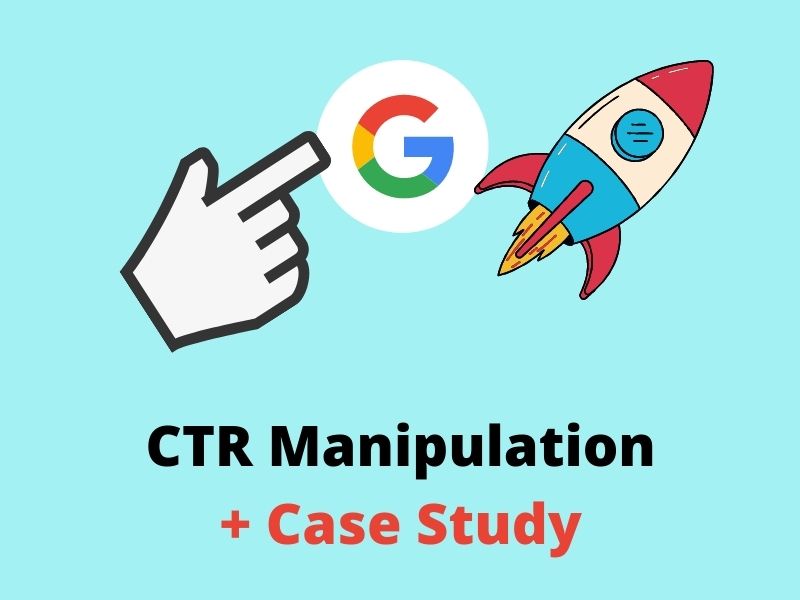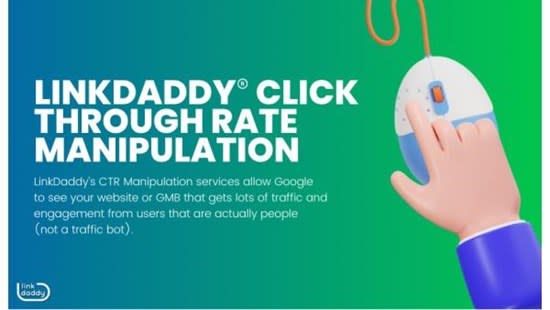Effective CTR Manipulation: Increase Your Click-Through Fees and Visibility
Discovering the Connection In Between CTR Control Providers and Customer Actions
In the world of digital advertising, the impact of click-through price (CTR) manipulation services on individual actions continues to be a complicated and intriguing topic. As on the internet systems significantly count on CTR metrics to determine the success of content, items, and services, understanding exactly how these manipulated rates influence customer engagement and decision-making procedures is extremely important. The interplay between CTR control and user habits questions concerning authenticity, reliability, and the moral effects of such practices. By dissecting the complex relationship in between CTR adjustment services and customer behavior, fascinating understandings arise that may improve our understanding of electronic advertising and marketing strategies and their effects on consumers.
Impact of CTR Control on Actions
Evaluating the impact of Click-Through Price (CTR) control on individual habits discloses essential understandings right into the dynamics of online engagement. CTR adjustment involves synthetically blowing up the variety of click a specific link or advertisement to trick customers and internet search engine. This practice can lead to a distorted understanding of a webpage's popularity or relevance, eventually impacting user actions.

Furthermore, CTR adjustment can skew the data used by formulas to personalize customer experiences. This can cause customers being offered content that does not align with their preferences or rate of interests, ultimately leading to a decline in customer satisfaction and interaction. Recognizing the effect of CTR adjustment on individual actions is important for maintaining openness and rely on online communications.
Customer Involvement With Controlled CTR
User involvement with manipulated CTR data typically brings about manipulated assumptions of on-line material appeal and importance. When individuals interact with content based on unnaturally filled with air Click-Through Fees (CTR), they might believe that particular information, products, or services are more popular or credible than they in fact are. This can cause users choosing based on deceptive data, leading to potentially negative outcomes.
Interaction metrics like likes, shares, remarks, and time invested on a web page are frequently affected by CTR control. Users may be extra likely to involve with content that shows up to have greater involvement rates, additionally perpetuating the cycle of skewed perceptions. Consequently, content developers and advertisers may focus on producing web content that creates high CTR instead of concentrating on developing truly useful and relevant product.

Mental Results of CTR Control

Furthermore, the mental effects of CTR adjustment can additionally show up click site in transformed decision-making procedures. Users might be a lot more likely to click on content solely based on its viewed popularity, instead than its real worth or relevance to their requirements. This behavior shift can lead to a shallow involvement with online material, where customers might ignore high-grade but less prominent offerings for those with synthetically boosted CTRs.
Fundamentally, the mental ramifications of CTR manipulation highlight the value of keeping openness and authenticity in online communications to foster authentic user involvement and depend on.
Ethical Factors To Consider in CTR Adjustment
Taking into consideration the moral effects of manipulating click-through prices (CTR) in on-line systems is critical for preserving stability and count on within the digital community. CTR adjustment elevates issues concerning tricking users, misshaping information analytics, and jeopardizing the credibility of on-line material. One major moral consideration is the potential impact on customer freedom and decision-making. By synthetically blowing up CTR, customers might be deceived right into clicking links or ads they would not have actually selected or else, bring about a disingenuous online experience. Moreover, CTR adjustment can skew the performance metrics that services depend on to make calculated choices, inevitably impacting market competition and customer depend on.
One more ethical aspect to ponder is the fairness of controling CTR to obtain an unreasonable advantage over rivals. Engaging in such practices not just goes against principles of reasonable play however additionally threatens the count on that individuals place in online systems. It is crucial for services and electronic online marketers to maintain moral requirements in their practices to guarantee transparency, credibility, and long-term sustainability in the on-line environment.
Effects for Digital Marketing
With the raising reliance on digital platforms for advertising functions, the practice of he said manipulating click-through rates (CTR) positions substantial ramifications for the performance and stability of digital advertising this hyperlink strategies. CTR adjustment can lead to manipulated data analytics, misleading marketing experts right into believing that their projects are doing much better than they actually are. This can lead to misallocation of sources, with business purchasing underperforming approaches based upon falsified CTRs. When users realize that CTRs have actually been adjusted, it can wear down count on in the brand, leading to long-lasting adverse effects for customer commitment and brand name reputation.
Furthermore, using CTR adjustment services can create an unjust affordable landscape, where companies that take part in such techniques gain a synthetic advantage over those that adhere to moral advertising requirements. This can suppress advancement and imagination in electronic marketing, as success comes to be even more concerning adjustment tactics than delivering authentic worth to consumers. Ultimately, the implications of CTR manipulation for electronic advertising and marketing expand beyond temporary gains, influencing the total sustainability and trustworthiness of marketing efforts in the electronic realm.
Verdict
Finally, the connection between CTR control services and user behavior is intricate and complex. The influence of CTR adjustment on actions, individual interaction with adjusted CTR, psychological results, moral factors to consider, and ramifications for electronic advertising all play a function in shaping this connection. Recognizing these dynamics is important for marketing professionals and scientists alike in order to navigate the ethical effects and make the most of the performance of their digital advertising approaches.